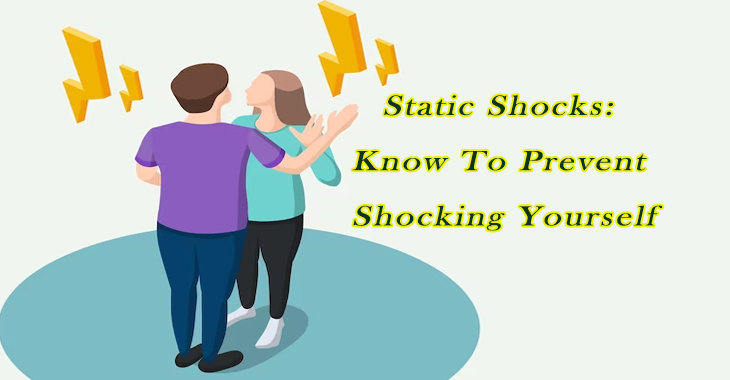
Together with the shortening of the day and the cold, static electricity is one of the painful aspects of winter. This annoying occurrence causes objects to shock us when we contact them and makes our garments stick to one another and to ourselves.
If you’ve ever come into touch with static electricity, you’ll be familiar with the poke, twinge, or pinch sensation that can be a tiny sign of an electric shock.
While severe electric shocks can create muscle spasms that make it difficult to release the electrical source, small electric shocks may be so faint as to be invisible.
What is Static electricity?
The accumulation of an electrical charge on another object’s surface is known as static. A shock is created as the charge transfers from one object to another and releases electricity. Humidity has a direct impact on it. When the air is cold and the humidity is low, static builds up. You raise the heat in your house to stay warm, which further contributes to a drop in humidity and an increase in static electricity. There are a few easy things you can do to lessen static, despite the fact that it can be inconvenient and occasionally uncomfortable.
Reintroducing water to the air circulating in your home is likely the most crucial piece of advice. There are various methods for doing this. Initially, a continuous stream of moisture can be created using a humidifier. This might be a humidification unit attached to your home’s heating or a unit placed in the room you’re in right now.
Why am I getting so many static shocks all of a sudden?
Air conditioning or central heating indoors can create extremely dry conditions that encourage static electricity. The air becomes warmer and becomes less humid when heated. Static shocks are frequently felt in chilly, dry weather, especially while within a space that is centrally heated, and they may go away when the climate becomes more humid.
If you don’t have a humidifier, you can add moisture to the air by setting a pot of water on the stove and letting it evaporate. This might be very pleasant if you also include fragrant elements, such as evergreen sprigs or a few drops of lavender essential oil. Don’t forget to keep the pot moist.
Setting an alert will allow you to move freely away from the stove.
The fabric in your carpet, upholstery, and clothing is a significant generator of static electricity. In these situations, dryer sheets can greatly help to eliminate static. Although you can’t put your furniture in the dryer, you can use a dryer sheet to clean the upholstery’s surface.
Try dressing in natural textiles like cotton to reduce static in your clothes. Something synthetic will develop a charge more quickly and, as a result, provide the shock when you touch it.
We should keep a few things in mind to prevent static electrical shock.
These are some tips for preventing static electrical shock:
1. Humidify the Air
The likelihood of static electrical build-up increases with increasing air aridity. One technique to encourage more indoor humidity is by purchasing or increasing your stock of indoor plants. The same goes for leaving the bathroom door open after using the fan while taking a shower.
2. Wear Natural Fibers
Synthetic materials are more likely to accumulate static charges than natural fibres in clothing.
3. Use Anti-Static Hand Lotion
Use an anti-static hand lotion if you have dry skin to assist prevent shocking yourself at the worst possible time.
4. Go Barefoot
This is an antiquated method of lowering static accumulation, but it still works. Aluminum foil can be used to achieve the same result when covering your shoes, socks, or pyjamas, but that doesn’t exactly create a fashion statement, does it?
5. Purchase Ant-Static Mats & Products
You can buy mats, wristbands, heal straps, conductive shoes, anti-static sprays, and other items to help you get rid of static buildup and stop unintentional discharges of static electricity.
Read More
All People will have personal AI assistants like ChatGPT: Web Inventor

